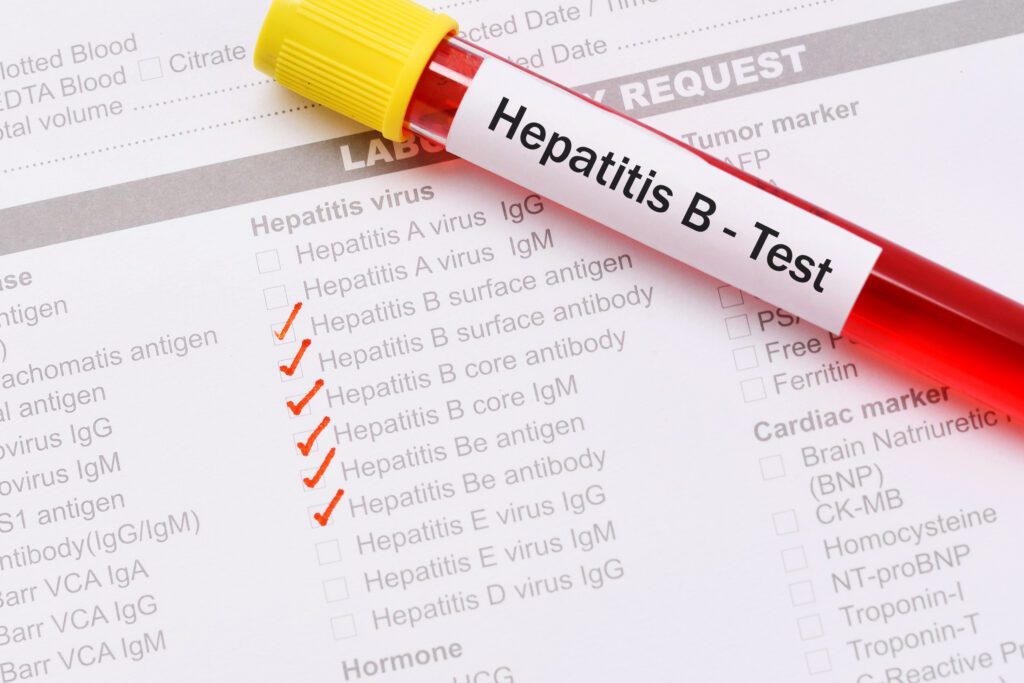Key Takeaways
- It’s important to get proper screening for hepatitis B before starting an immunosuppressant medication.
- These drugs can reactive “dormant” virus in your body, which can cause serious liver damage.
- New research shows the vast majority of rheumatology patients are not properly screened for hepatitis B before starting immunosuppressant medication.
- If you are found positive for hepatitis B, you can take medication to clear it.
Hepatitis B is one of those sneaky viruses that can hang out in your body for a long time — decades, even — without you knowing it. Meanwhile, it could be slowly damaging your liver. That’s problematic for anyone, but if you start taking an immune-suppressing medication the result could be dangerous or even deadly. With your immune response lowered, the hepatitis B virus could “reactivate” and cause damage, including acute liver failure.
To sidestep this problem, some health organizations, including the U.S. Centers for Disease Control and Prevention (CDC), advise that doctors screen people with rheumatic or other inflammatory conditions for hepatitis B before starting them on immune-suppressing drugs, but it’s not clear how often it’s actually happening.
To find out, a group of Boston-based researchers conducted a study, which was published in the Journal of Rheumatology. They examined data on all adult rheumatology patients in the large Mass General Brigham health system, focusing on those who had started tocilizumab (Actemra) or tocilizumab (Xeljanz) before December 31, 2018. (They focused on these medications because they are newer rheumatic drugs, so doctors might not have as well-established protocols for prescribing them in place.)
They identified 678 patients who had started on tocilizumab and found that only 29 percent of them had completely “appropriate” hepatitis B screening before starting the drug. Another 45 percent had “partial” screening, and 26 percent hadn’t been screened at all.
They also identified 391 patients who had started tofacitinib. Of that group, only 24 percent had completed appropriate hepatitis B screening, 50 percent had partial screening, and 26 percent had not been screened.
The researchers considered someone to have been fully and appropriately screened if their blood was screened with three tests known as HBsAg, total anti-HBcAb, and HBsAb. They deemed someone partially screened if they had had any one or two of these tests.
For an accurate diagnosis, all three tests are needed because the tests measure different things: whether you currently have the virus, whether you were infected with it in the past, and whether you had it but your body has cleared the virus. Having all three tests also gives your doctor information about the likelihood that the virus will reactivate in your body (assuming you’re not currently infected).
“Reactivation of the hepatitis B virus is characterized by increased [hepatitis B virus] replication, which can cause acute liver failure and death among people taking immunosuppressive drug therapy,” the authors explained, adding that reactivation “is a preventable complication of immunosuppressive drug therapy, yet fewer than one-third of rheumatology patients initiating [tocilizumab] or [tofacitinib] at a large health system completed appropriate [hepatitis B] screening.”
If you currently have hepatitis B, or if blood tests suggest that you’ve had it and it’s likely to reactivate in your body, then you will likely need to take oral medication to treat the virus before starting immunosuppressive medication.
Interestingly, they also determined that 22 percent of patients using these two drugs were given “inappropriate” hepatitis B tests, including specific tests that are usually only administered after someone is identified via the standard three-test panel as being positive for the virus.
The authors urged clinical societies, such as the American College of Rheumatology, to consider issuing formal recommendations for universal hepatitis B screening of patients. They noted that “risk factors are frequently unreported by patients and unrecognized by physicians,” and that the growing opioid epidemic also has the potential to increase rates of hepatitis B.
Hepatitis B is spread by through blood and other bodily fluids, so it may be spread through sexual contact or sharing needles or syringes. It also spreads from mother to baby in the womb. Because it is very prevalent in Asia, mothers who don’t realize they have it often unknowingly transmit it to their babies. It also impacts many Asian-Americans; 60 percent of Americans with hepatitis C are of Asian descent.
Found This Study Interesting? Get Involved
If you are diagnosed with arthritis or another musculoskeletal condition, we encourage you to participate in future studies by joining CreakyJoints’ patient research registry, ArthritisPower. ArthritisPower is the first-ever patient-led, patient-centered research registry for joint, bone, and inflammatory skin conditions. Learn more and sign up here.
Addressing Viral Hepatitis in People With Substance Use Disorders. https://www.ncbi.nlm.nih.gov/books/NBK92029.
Hepatitis B Blood Tests. Hepatitis B Foundation. https://www.hepb.org/prevention-and-diagnosis/diagnosis/hbv-blood-tests.
Karadağ Ö, Kaşifoğlu T, Özer B, et al. Viral hepatitis screening guideline before biological drug use in rheumatic patients. Eur J Rheumatol. 2016;3(1):25-28. doi:10.5152/eurjrheum.2015.150072.
Know Hepatitis B. U.S. Centers for Disease Control and Prevention. https://www.cdc.gov/knowhepatitisb.
Mohareb AM, et al. Screening for Hepatitis B Virus Prior to Initiating Tocilizumab and Tofacitinib in Patients With Rheumatic Diseases: A Cross-sectional Study. The Journal of Rheumatology. January 2022. doi: https://doi.org/10.3899/jrheum.210257.
Other Tests: Additional Hepatitis B Blood Tests. Hepatitis B Foundation. https://www.hepb.org/prevention-and-diagnosis/diagnosis/other-tests.
When Someone Close to You Has Hepatitis B. U.S. Centers for Disease Control and Prevention. June 2010. https://www.cdc.gov/hepatitis/hbv/pdfs/hepbwhensomeoneclose.pdf.






